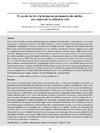Please use this identifier to cite or link to this item:
https://accedacris.ulpgc.es/jspui/handle/10553/105862
| DC Field | Value | Language |
|---|---|---|
| dc.contributor.author | Morales Almeida, Paula | en_US |
| dc.date.accessioned | 2021-03-17T15:03:51Z | - |
| dc.date.available | 2021-03-17T15:03:51Z | - |
| dc.date.issued | 2013 | en_US |
| dc.identifier.issn | 2340-7719 | en_US |
| dc.identifier.uri | https://accedacris.ulpgc.es/handle/10553/105862 | - |
| dc.description.abstract | La Unesco en sus diferentes conferencias internacionales sobre la educación de adultos, ha incidido en diferentes aspectos esenciales para reforzarla en todos los países. En su quinta conferencia, la Unesco confirma que las tecnologías de la información y la comunicación (en adelante tic) son un instrumento poderoso para las personas porque incrementa su poder y les da acceso a la información, el bien más preciado en este siglo xxi. Y profundiza en la necesidad de una educación permanente, una formación que se debe realizar durante toda la vida y ya no solo durante la infancia y juventud. De ahí que la educación permanente sea una de las grandes apuestas para este siglo. Pero también es necesario que las personas adultas y las mayores adquieran la competencia digital, tan importante en nuestros días, para que puedan tener una mejor calidad de vida, porque así podrán seguir siendo ciudadanos autónomos. No olvidemos que las tic nos facilitan muchas de las tareas cotidianas de la vida y están presentes en todos los ámbitos, en las administraciones públicas, en las educativas, en la empresa privada y en el ámbito personal. Así, si los mayores acceden a las tic de una manera responsable, seguirán siendo partícipes de esta sociedad, por lo que su vida tendrá una mayor calidad. Veremos el caso de un grupo de mujeres que vieron cómo su calidad de vida aumentaba a medida que conocían y aplicaban los conocimientos adquiridos en un curso de informática y comprobaron cómo aún son útiles en la sociedad y pueden seguir aprendiendo cosas nuevas, aunque ellas creyeran al principio que era imposible. | en_US |
| dc.description.abstract | Unesco has insisted on various essential aspects to reinforce adult education in all countries in its various international conferences about it. In its Fifth Conference, unesco confirms that information and communication technologies (ict) are a powerful tool for people because it improves their control and gives them access to the most precious element in this xxi century: information. Unesco deepens on the need for ongoing education training that must be done during a lifetime, not just during childhood and youth. Therefore, lifelong learning is one of the key points for a good functioning society. But it is also necessary that adults and elders acquire the digital competition so important nowadays, in order to make available to them a better quality of life. That way they may continue to be autonomous citizens. We must do not forget that ict make our lives easier to live and are present in all day-to-day areas such as government, education, private enterprise and personal level. Consequently, if elders access to ict in a responsible manner they will continue to be a part of society, so their life will have higher quality. We will see a group of women as case study. They noticed how their quality of life improved as they learned and applied the knowledge acquired in various computer classes. They finally found out that they can be an useful element of society and that they can keep learning new things, although they first thought that was impossible. | en_US |
| dc.language | spa | en_US |
| dc.relation.ispartof | Ariadna (Castellón) | en_US |
| dc.source | Ariadna (Castellón) [ISSN 2340-7719], v. 1 (1), p. 58 | en_US |
| dc.subject | 580201 Educación de adultos | en_US |
| dc.subject | 630909 Posición social de la mujer | en_US |
| dc.subject.other | TIC | en_US |
| dc.subject.other | Adultos | en_US |
| dc.subject.other | Educación permanente | en_US |
| dc.subject.other | Formación | en_US |
| dc.subject.other | Calidad de vida | en_US |
| dc.subject.other | ICT | en_US |
| dc.subject.other | Adults | en_US |
| dc.subject.other | Lifelong education | en_US |
| dc.subject.other | Training | en_US |
| dc.subject.other | Quality of life | en_US |
| dc.title | El uso de las tic y la formación permanente del adulto: una mejora de la calidad de vida | en_US |
| dc.type | info:eu-repo/semantics/article | en_US |
| dc.identifier.doi | 10.6035/Ariadna.2013.1.9 | en_US |
| dc.description.lastpage | 62 | en_US |
| dc.identifier.issue | 1 | - |
| dc.description.firstpage | 58 | en_US |
| dc.relation.volume | 1 | en_US |
| dc.investigacion | Ciencias Sociales y Jurídicas | en_US |
| dc.type2 | Artículo | en_US |
| dc.utils.revision | Sí | en_US |
| dc.identifier.ulpgc | Sí | en_US |
| dc.contributor.buulpgc | BU-HUM | en_US |
| item.grantfulltext | open | - |
| item.fulltext | Con texto completo | - |
| crisitem.author.dept | GIR Sociedad Digital | - |
| crisitem.author.dept | Departamento de Psicología, Sociología y Trabajo Social | - |
| crisitem.author.orcid | 0000-0002-4420-1918 | - |
| crisitem.author.parentorg | Departamento de Psicología, Sociología y Trabajo Social | - |
| crisitem.author.fullName | Morales Almeida, Paula | - |
| Appears in Collections: | Artículos | |
Page view(s)
80
checked on Jan 11, 2026
Download(s)
42
checked on Jan 11, 2026
Google ScholarTM
Check
Altmetric
Share
Export metadata
Items in accedaCRIS are protected by copyright, with all rights reserved, unless otherwise indicated.
